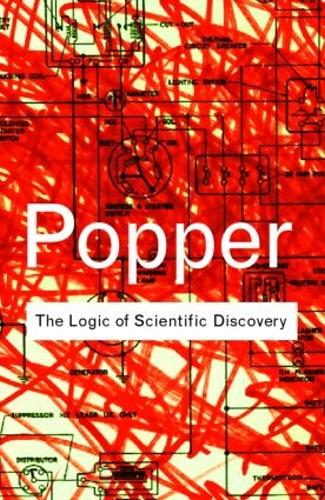The Logic of Scientific Discovery

Ratings/reviews counts are updated frequently.
Check link for latest rating. ( 5,373 ratings, 206 reviews)Read More
Found a better price? Request a price match

The Logic of Scientific Discovery
Book Hero Magic created this recommendation. While it's new and still learning, it may not be perfect - your feedback is welcome! IS THIS YOUR NEXT READ?
The Logic of Scientific Discovery
First published in English in 1959, Karl Popper's "The Logic of Scientific Discovery" revolutionized contemporary thinking about science and knowledge and is one of the most widely read books about science written in the 20th century.
The Logic of Scientific Discovery by Karl Popper stands as a monumental text in the philosophy of science, one which has profoundly influenced both the academic world and the practical methodology of scientific research. This seminal work delves into the nature of scientific inquiry, presenting a rigorous analysis of the scientific method and challenging the foundational concepts of empirical science.
Popper introduces and elaborates on his revolutionary principle of 'falsificationism', arguing that scientific theories cannot be conclusively proven; instead, they must be subjected to stringent tests and should only be considered valid until they are falsified. This approach contrasts sharply with the traditional view of science as a gradual accumulation of positive evidence.
Throughout the book, Popper engages with the works of other philosophers and scientists, critically analysing their contributions and drawing on examples from physicists such as Einstein and Newton to elucidate his arguments. He meticulously constructs his philosophy, combining logical analysis with practical examples in a persuasive and impactful manner.
Described by the philosopher A.J. Ayer as a work of "great originality and power", The Logic of Scientific Discovery revolutionised contemporary thinking on science and knowledge. Ideas such as the now legendary doctrine of 'falsificationism' electrified the scientific community, influencing not only philosophers but also working scientists and shaping post-war intellectual discourse.
This astonishing work ranks alongside The Open Society and Its Enemies as one of Popper's most enduring books. Its insights and arguments continue to demand attention and engagement from readers to this day. For anyone seeking to understand the nature and philosophy of scientific inquiry, The Logic of Scientific Discovery remains an essential and profoundly influential text.
Series: Routledge Classics
View allBook Hero Magic summarised reviews for this book. While it's new and still learning, it may not be perfect - your feedback is welcome! HOW HAS THIS BEEN REVIEWED?
The Logic of Scientific Discovery by Karl Popper is highly regarded as a crucial work in the philosophy of science. It is praised as a significant text of the twentieth century, with influential ideas on scientific methodology and falsifiability. Peter Medawar, writing for New Scientist, highlighted its monumental importance.

Book Details
INFORMATION
ISBN: 9780415278447
Publisher: Taylor & Francis Ltd
Format: Paperback / softback
Date Published: 21 February 2002
Country: United Kingdom
Imprint: Routledge
Edition: 2nd edition
Audience: General / adult, Tertiary education
DIMENSIONS
Width: 129.0mm
Height: 198.0mm
Weight: 580g
Pages: 544
Also by Karl Popper
View allMore from Education & Reference
View allWhy buy from us?
Book Hero is not a chain store or big box retailer. We're an independent 100% NZ-owned business on a mission to help more Kiwis rediscover a love of books and reading!

Service & Delivery
Our warehouse in Auckland holds over 80,000 books and puzzles in-stock so you're not waiting for your order to arrive from overseas.

Auckland Bookstore
We're primarily an online store, but for your convenience you can pick up your order for free from our bookstore, which is right next door to our warehouse in Hobsonville.

Our Gifting Service
Books make wonderful thoughtful gifts and we're here to help with gift-wrapping and cards. We can even send your gift directly to your loved one.


































